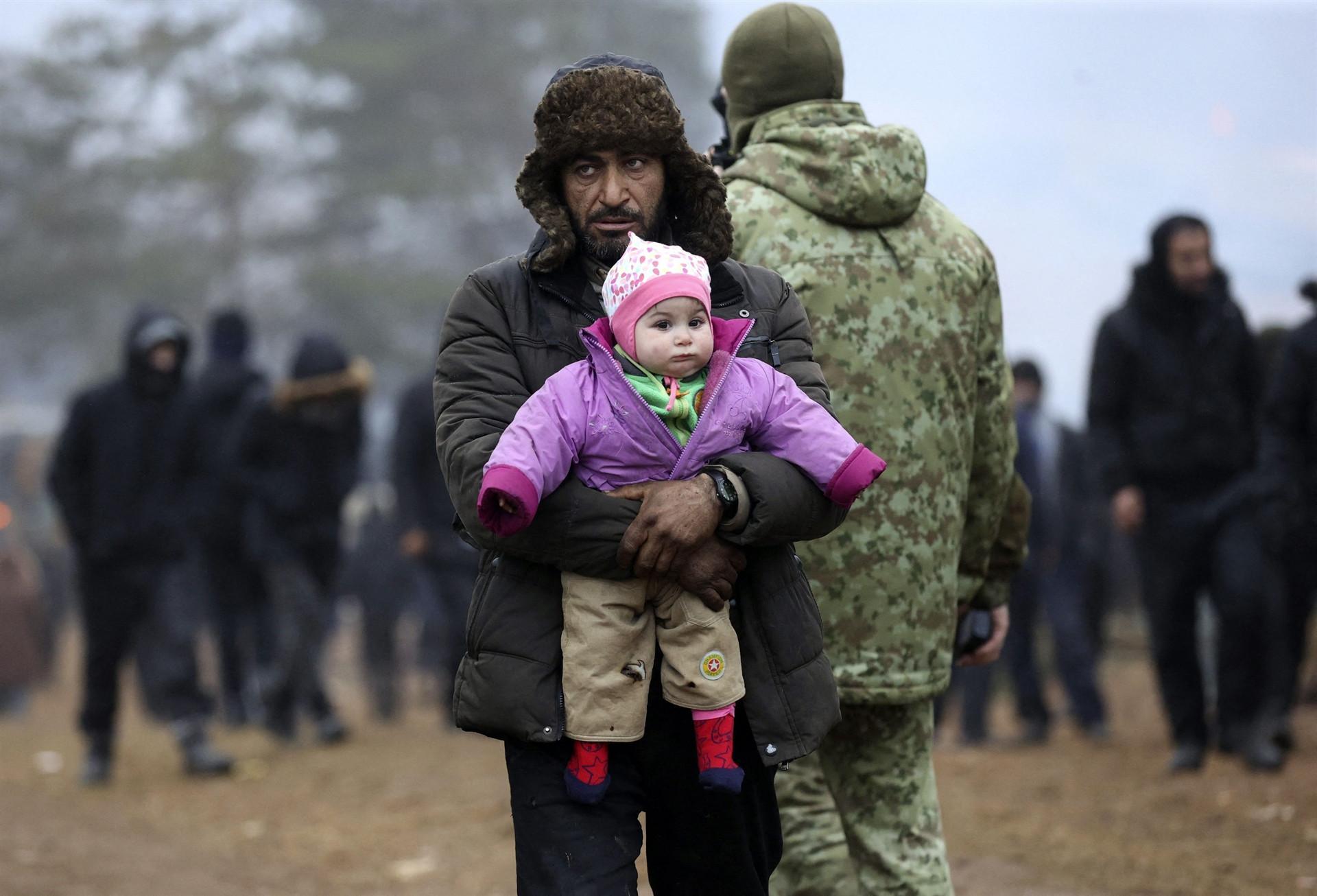US, EU vow new sanctions against Belarus as migrants mass at border
SOKOLKA-Agence France-Presse

The European Union and the United States vowed on Nov. 15 to press ahead with fresh sanctions against the regime of Belarus President Alexander Lukashenko, as migrants massed at the Polish border despite Minsk claiming it was trying to repatriate them.
"Attention, attention: illegal border crossing is forbidden. You will face criminal charges," blared out from Polish loudspeakers, as hundreds of mainly Middle Eastern travellers set up tents at the Bruzgi border post.
Belarus forces had channelled the crowd towards the last line of Polish razor wire, but they were brought up short by the police cordon before they could cross onto EU soil, and the stand-off continued.
In Brussels, EU foreign ministers met and agreed that their existing sanctions regime targeting Lukashenko and his allies will be expanded to include individuals or companies found to have encouraged border crossings.
No new names were added to the sanctions list, but EU foreign policy chief Josep Borrell said this would be done in the "coming days".
After meeting the ministers, Borrell said the new sanctions would hit "quite an important number" of individuals and entities.
"By expanding the scope of the sanctions, we will be able to target those responsible for exploiting vulnerable migrants," Borrell said.
Diplomats said the new penalties are expected to target around 30 Belarusian officials, the state airline and travel agencies.
In coordination with the EU, the United States said it was preparing new sanctions that would "continue to hold the Lukashenko regime accountable for its ongoing attacks on democracy and human rights and international norms."
Migrants have been trying to cross from Belarus into EU member Poland for months, but tensions soared last week as coordinated efforts to cross were turned back by Polish border guards.
The EU accuses Belarus of sending the migrants to the border as retribution for earlier sanctions, but the threat of further measures moved Lukashenko to offer an apparent olive branch.
Lukashenko on Nov. 15 discussed the crisis with German Chancellor Angela Merkel, in his first phone call with a Western leader since suppressing mass protests in Belarus last summer.
The pair discussed bringing humanitarian aid to people stuck at the border, Minsk and Berlin said.
In Washington, U.S. State Department spokesman Ned Price noted that Moscow has "sway" over Lukashenko’s regime "in a way that few, if any, other countries do, and we would certainly welcome Moscow using its influence" to bringing about an end to the crisis.
Also on Nov. 15 evening, Lukashenko’s Russian ally Vladimir Putin discussed the crisis with French President Emmanuel Macron, with both leaders calling for the crisis to be de-escalated.
Lukashenko earlier said Belarus did not want the border situation to escalate into a "conflict" and that it was working to send home the several thousand migrants camping on its wooded border with Poland in damp and freezing conditions.
"But nobody wants to go back," Lukashenko said, quoted by the state news agency Belta.
Lithuanian Foreign Minister Gabrielius Landsbergis, speaking for many of the 27 EU governments, said Brussels had "no reason" to believe Lukashenko.
The Belarusian leader also suggested that, if Poland does not provide a "humanitarian corridor", Minsk could send the migrants to Germany via its state-run airline Belavia.
Poland said on Nov. 15 that Belarusian forces were bringing groups of migrants to the Kuznica border crossing, and Warsaw’s interior ministry announced it would start building a border wall next month.
Belarus’ state border committee rejected the accusation, saying the migrants had "self-organized" and that Belarusian border guards were present to "ensure safety".
Lukashenko denies accusations that he has organized the migrants on the border, saying on Nov. 15 the situation was proving "expensive" for his country.
And he repeated warnings that Belarus would defend itself if new sanctions are imposed.
Belarus has faced waves of EU sanctions in response to a crackdown on the opposition after last year’s presidential elections and Lukashenko’s decision to ground a Ryanair flight in Minsk earlier this year to detain an activist.
Belarus says there are about 2,000 people in the migrant camp, including pregnant women and children, while Poland says there are between 3,000 and 4,000 migrants on the border.
Poland has refused to let the migrants in - detaining 50 on Nov. 14 after they entered the country - and has accused Belarus of preventing them from leaving.
Local police in Poland’s Podlasie region on Nov. 15 said four Europeans had been detained during road checks for "aiding illegal border crossings".
Aid agencies say at least 10 migrants have died so far and have warned of a humanitarian crisis unfolding as temperatures drop below freezing.
There have been signs in recent days, though, that the crisis could relent.
Belavia has announced that nationals from a host of Middle Eastern countries were banned from incoming flights from Turkey and the United Arab Emirates at their request.
And on Nov. 15 , the Iraqi government said it was organizing a repatriation flight this Thursday for its citizens stuck on the Poland-Belarus border on a "voluntary" basis.
















